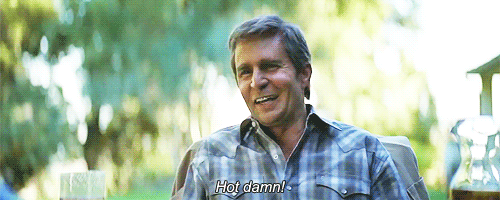There aren't many Vice Presidents people would want to see a movie about, and I don't know if Dick Cheney is one, either. Not because he was inconsequential like most Veeps are, but because he was TOO consequential. The most hated man in government for the entire stretch of his time alongside George W. Bush, Cheney makes for an easy target for director Adam McKay's righteous anger in Vice, which savagely satirizes him and the circle of cronies he ran with in much the same scattershot-but-entertaining way he did the financial system in The Big Short. McKay is big on outrage but if you're looking for insight, it's sorely lacking.
The interesting thing about it is that Cheney is such a clandestine figure that McKay is pretty damned justified in characterizing him any way he pleases. It's not like Cheney is going to come out and refute it, or pull a Trump and demand the courts rule on whether he can be made fun of. And that's a good thing for us because Vice is best the more farcical it gets. All of the 4th-wall-breaking, ripcord editing, and snappy diversions that made The Big Short such an unexpected Best Picture nominee are employed here to similar effect, aided by a star-studded cast that looks like they walked in right from a David O. Russell movie. But the one thing McKay can't do is mask the seriousness of Cheney's machinations. No matter how funny this spiral into the absurdity of our politics is, McKay makes clear the price paid for allowing someone like Cheney into our midst won't be paid by him or the power brokers he serves, but by all of us.
Christian Bale makes an unlikely star to play the unlikely Vice President, but we've seen the actor transform physically so often it shouldn't be a shock. Vice zips through Cheney's life to show the many ways in which he basically failed his way upwards, clinging on to the right people at just the right time to help his career. As far as motivations go, Cheney was never about seeing some particular conservative ideology play out. Early in his career while acting as a gopher for then-Nixon staffer Donald Rumsfeld (Steve Carell, grandfatherly), Cheney asks him with all of the naiveté of a lost lamb, "What do we actually believe in?" The question causes Rumsfeld to laugh dead in his face. We're meant to laugh at it, too.
The engine that drives Cheney is power, or better put, it's power that drives his Lady Macbeth wife Lynne (Amy Adams). She wants it, and her husband, then just a failed Yale student bouncing around from bars to prison and back again, wasn't going to make her a powerful woman. After her ultimatum to turn his life around, Cheney vows never to let her down again. It's not the first time he would bow his head to power, but it was the most significant.
Whether this scene actually happened, I don't know. Probably not. Just as McKay broke down the financial crisis into easily-digestible bite-sized nuggets, he's found a way to make Cheney someone we can understand and...if you're so inclined, sympathize with. Cheney's craving for power would see him become the ultimate opportunist, jumping back into government when the mentally-weak George W. Bush (portrayed as a BBQ-munching dunce by Sam Rockwell) comes begging for him to be his VP.
McKay's biting wit has its ups and downs but in general the more directly it attacks Cheney, the better. His frequent heart attacks are perhaps the film's best recurring gag, with the VP comically dropping to the floor at the most inopportune moments. A scene in which the film's closing credits roll a full 90-minutes too early and tease a "Happily Ever After" ending is downright hilarious because the truth is so awful. And yet, sometimes McKay's tactics are straight-up bush league, like a heavy-handed bit where a waiter (played by Alfred Molina) literally serves up a menu of Cheney's most heinous abuses of power. "We'll have them all", Cheney says eagerly after an offering of "extraordinary rendition", "enemy combatants", and "Guantanamo Bay".
Vice eventually grows pretty grim as McKay tries, with little success, to make Cheney a more complicated figure than he had been for the entire movie. While he has no problem sending thousands of troops to die in Iraq because it suits his agenda, he doesn't have the strength to keep a promise to his lesbian daughter Mary (Alison Pill) not to publicly oppose same-sex marriage. Cheney's connection to a mysterious narrator (Jesse Plemons) is an unnecessary twist in a difficult final act devoid of McKay's whip smart observations.
Watching Vice it's still hard to fathom the guy who gave us Anchorman and Step Brothers is now seeking to inform as well as entertain. Some may claim he's only speaking to the choir here, but Cheney's approval rating when leaving office was 13%, so I guess the choir is damn near everybody? You're not going to come away from Vice having learned anything new about Cheney, and certainly nothing that will change your mind about him, but that's not what McKay is going for. When George Bush's painting and candy-passing antics are allowing him to be forgiven so easily, it's important to be reminded just how corrosive his administration was and the people behind it, so we don't let them get the levers of power again.
Rating: 3.5 out of 5















